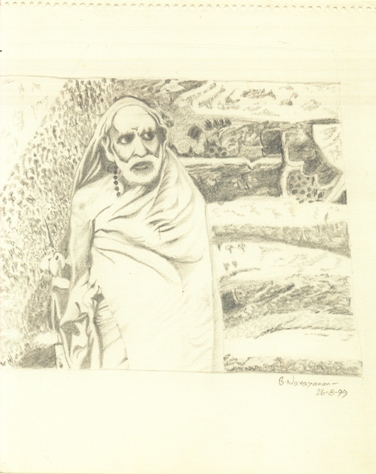Jaya Jaya Sankara Hara Hara Sankara – Ra. Ganapathi Anna’s up-close observations of Sri Periyava has been mentioned in the preface of Deivathin Kural Vol 1 which is detailed out in this chapter below.
Thanks to Shri. B. Narayanan Mama for the translation and excellent drawing. Rama Rama
ஸ்ரீ ரா.கணபதி கண்ட மஹாபெரியவா.
(ஸ்ரீ ரா.கணபதி தெய்வத்தின் குரல் முதற்பகுதிக்கு 1976-ஆம் ஆண்டு எழுதிய முகவுரையிலிருந்து).
“தெய்வத்தின் குரல்” என்று பெயரிட்டிருக்கிறோம். ஆனால், இம்மொழிகளை இயம்பியவர், தம்மை தெய்வமாக வைத்தா பேசியிருக்கிறார்? தானே தெய்வமாகப் பேசுவதாக கீதாசாரியன் சொன்னானே, அப்படியா இவர் பேசியிருக்கிறார்? தெய்வக் குமாரனாகப் பேசுவதாக இயேசுநாதர் சொல்லிக்கொண்டாரே இன்னும் பல மத ஸ்தாபகர்களும் தெய்வக்கட்டளைகளையே தாங்கள் வெளியிடுவதாகச் சொன்னார்களே, அந்த முறையிலா இந்நூல்வழி பேசுபவர் பேசியிருக்கிறார்? “எனதுரை தனதுரையாக” என்று சம்பந்தரும், “தன்னைத் தான் பாடி” என்று நம்மாழ்வாரும், இதே ரீதியில் மற்றும் பல அநுபூதிமான்களும் கூறுவது போல் இவர் எங்கேயானும் கோடியாவது காட்டியிருக்கிறாரா? இல்லவே இல்லை. தம்மை தெய்வமாகக் காட்டிக் கொள்ளாதது மட்டுமில்லை; தாம் தெய்வத்தின் குரலை வெளியிடும் கருவி என்ற ரீதியில் கூடச் சொல்லிக்கொள்ளவில்லை. அது மட்டுமல்ல, மகானாக மேம்பாடுற்ற மனிதராகக்கூட அவர் தம்மை வெளிப்படுத்திக் கொள்ளவே இல்லை. தோஷங்கள் நிரம்பிய நம்மில் ஒருவராகத்தான் தம்மை ஆங்காங்கு வர்ணித்துக் கொள்கிறார்.
ஆனால், இதைவிடப் பெரிய வேஷமில்லை என்று அடியார்கள் அறிவர். லௌகீக வேண்டுதல்களிலிருந்து பரஞானம் வரையில் சகல விதமான அனுக்கிரஹங்களையும் எண்ணற்ற அடியாருக்கு வழங்கி வரும் ஸ்ரீ காஞ்சிப்பெரியவாளை பக்தருலகம் பரமாத்மாகவேதான் அறிந்திருக்கிறது. ஆனால், இங்கே இந்நூலில் இப்பரமாத்மாவின் அற்புத அனுக்கிரஹச் செயல்கள் விரியவில்லை. வாக்குதான் விரிகிறது. நம்மில் ஒருவராக அவர் தம்மைச் சொல்லிக்கொண்டாலும், ஆழ்ந்து ஊன்றிப் படிக்கும்போது இவ்வாக்கே அவரது பரமாத்ம அனுக்கிரஹமாக நெஞ்சில் வுகிறது. இது தெய்வத்தின் குரல்தான் என்று நம்மை உறுதியாக உணரச் செய்கிறது.
எதனால்?
நமக்கென்று தனிக்கருத்துக்கள், கொள்கைகள் உள்ளன. அதுதான் நம் தனித்தன்மையை உண்டாக்கும் தனி மனத்தின் லட்சணம், அவலட்சணமும் கூட. ஆனால் இந்தத் தொள்ளாயிரம் பக்கங்களை நீங்கள் படிக்கும்போது எங்கேனும் இதைப் பேசியவருக்கென்று ஒரு தனிக்கொள்கை, சித்தாந்தம், அபிப்பிராயம் இருப்பதாகத் தோன்றுகிறதா? எப்பேர்ப்பட்ட சமபாவம்! நடுநிலை! இப்படியும் ஒரு திறந்த மனம் இருக்க முடியுமா? எதையோ தனது என்று நிலைநாட்டிவிட வேண்டும் என்ற தனிமனித முனைப்பே இல்லாமல், எதைச் சொன்னாலும், தயங்காமல் ஆய்ந்து, அலசி அலசிப் பார்த்துப் புட்டுப் புட்டு விளக்கும் தெளிவினை என்னென்பது? இவர்கள் ஓர் மதத்தலைவராயினும், மதஸ்தாபகர்களைவிட மஹாகவியின் நோக்கும் வாக்கும்தான் உள்ளது உள்ளபடி கண்டுரைக்கும் என்கிறாரே (பக்.433) அப்படிச் சொல்வது இவர்களது திறந்த மனத்தையும் காட்டுவதல்லவா? இன்னோரிடத்தில், ஆதிசங்கரரின் அத்வைதம் உள்பட எம்மதமும் அதன் சித்தாந்தச் சிறப்பால் விசேஷமாக வளர்ந்து விடவில்லை என்று ஆணியறைந்தாற்போல் சொல்கிறாரே!(பக். 153-9) இது எப்பேர்பட்ட திறந்த உள்ளத்தைக் காட்டுகிறது!
சத்தியம் ஒன்றே குறிக்கோளாக, தனி மனித அபிப்பிராயத்தை அறவே தொலைத்துவிட்டு அவர் தமது தூய திருவுள்ளத்தைப் பூரணமாகத் திறந்து விட்டிருப்பதால், மகத்தான கோபுர வாயில் வழியாக மாருதம் முழு வீச்சுடன் பாய்வதே போல, அவர் மூலம் மெய்ப்பொருளின் திருக்குரலே பாய்கிறது. அதனால்தான் இது தெய்வத்தின் குரலாக இருக்கிறது.
இன்னும் வரும்………
________________________________________________________________________________________________________________________________
MahaPeriava as seen by Sri R.Ganapathi.
(From Sri Ra. Ganapathi Deivathin Kural Vol 1 Preface 1976)
We have named this book as ‘Dheyvathin Kural’.
But the speaker of these words has not put himself in the position of a God and spoken them.
Lord Krishna, the ‘GitAcharyan’, told (Arjuna) that He was speaking as a God, but our speaker had not even given a hint that he was speaking as a God.
Jesus said that he was speaking as ‘the son of GOD’, but not our speaker.
Founders of many religions have said that they were declaring the orders from the Divinity; but not our speaker.
Has he given any hint anywhere anytime, that he was speaking as God, like so many great souls like Sambandar or NammAzhvar did?
Never. Not only that he has not said so, but he has not even said that he was the instrument of God for speaking His voice.
Not only that. He has not even declared that he was a great soul. On the contrary, he has revealed himself as an ordinary human soul filled with the usual shortcomings like any one of us.
But devotees know that there is no greater ’DhOshA’ (anamoly) than this. The devotees have known him, who has blessed countless numbers of them with Anugrahams (boons) right from material requests to ultimate knowledge, as ‘ParamAtmA’ Himself.
But in this book, I have not dealt with His deeds of ‘Anugraham’, but only his speech. Even though he has declared himself as one among us, a deep, concentrated study of his speeches will reveal that his words are none other than those from ‘ParamAtmA’.
Why?
Everyone of us has our own opinions and principles. This is the quality or the lack of it, which creates our ‘individuality’. But when you go through these nine hundred pages, do you think that there exists a unique principle or opinion of the person who spoke these words? What an (unbiased) balanced, neutral view! Can there be such an open mind?
Without any selfish effort in order to prove that ‘I am right’ or ‘I said it’, he dissects each and every word he utters, analyses them threadbare, and explains them in detail. What a clarity of mind!
Even though he is the head of a religion, he says with an open mind that the views and words of the great poet will only reveal the sole truth than those of the religious heads (pp. 433). In another place, he emphatically says that no religion has grown purely because of its ‘SidhdhAntam’ (doctrine) including the ‘doctrine of Advaita’ established by AdhiSankarar (pp.153—9.). What an open- mindedness!
Discarding the individualistic opinion, and with the sole objective of establishing ‘Satyam’, he has opened out his heart fully. Voice of Truth (Satyam) flows from there, like the cool breeze flowing through the open door of the Gopuram (Temple tower.). And that is why this is ‘Dheyvathin Kural’ (the voice of God).
To be continued………..

